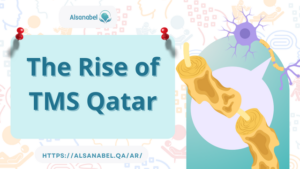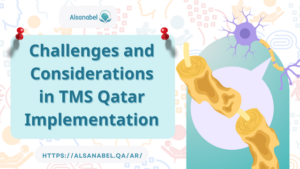How TMS Qatar is Revolutionizing Treatment for Multiple Sclerosis 2024
- Category Mental health Qatar
Multiple sclerosis (MS) is a challenging neurological condition, but recent advancements in treatment are offering new hope. TMS Qatar is at the forefront of these innovative approaches, revolutionizing how MS is treated. This article will explore how TMS Qatar is transforming the therapeutic landscape for MS patients, discussing the technology behind TMS, its benefits, and the positive impact it’s having on patients’ quality of life. We’ll delve into the effectiveness of this treatment in managing symptoms and potentially altering the course of the disease, marking a significant breakthrough in MS care.
The Rise of TMS Qatar
The rise of Transcranial Magnetic Stimulation TMS Qatar marks a significant advancement in mental health services in Qatar, offering new hope for individuals with treatment-resistant depression and potentially other psychiatric disorders. Here’s a detailed look at its emergence:

Adoption and Availability:
- Specialized Clinics: TMS services are becoming available in specialized psychiatric clinics and hospitals across Qatar. These facilities are equipped with state-of-the-art TMS devices and staffed by trained professionals who administer the treatment under strict guidelines.
- Integration into Healthcare Systems: TMS is being integrated into Qatar’s healthcare system, reflecting a commitment to expanding treatment options for mental health disorders beyond traditional therapies.
Clinical Application:
- Treatment for Depression: TMS is primarily used to treat depression that has not responded adequately to antidepressant medications. It offers a non-invasive alternative to electroconvulsive therapy (ECT), with fewer side effects and no need for anesthesia.
- Research and Development: Ongoing research and clinical trials in Qatar aim to explore the efficacy of TMS for other conditions, such as anxiety disorders, post-traumatic stress disorder (PTSD), and obsessive-compulsive disorder (OCD). This research contributes to expanding the scope of TMS applications in mental healthcare.
Patient Experience and Benefits:
- Non-Invasive Procedure: TMS involves delivering magnetic pulses to specific areas of the brain associated with mood regulation. Patients typically undergo multiple sessions over several weeks, with each session lasting about 20-30 minutes.
- Effectiveness and Safety: TMS has shown promising results in improving symptoms of depression, with studies indicating significant response rates among patients. It is generally well-tolerated, with minimal side effects such as mild scalp discomfort or headache.
Regulatory Framework and Standards:
- Compliance with International Guidelines: TMS clinics in Qatar adhere to international standards and guidelines for safety, efficacy, and patient care. Regulatory bodies ensure that TMS procedures are conducted by qualified professionals in a safe and controlled environment.
- Patient Selection and Assessment: Patients undergo thorough assessments by psychiatrists or mental health specialists to determine their eligibility for TMS based on their treatment history and current symptoms.
Future Directions:
- Awareness and Education: Continued efforts to raise awareness among healthcare providers and the public about TMS as a viable treatment option will be crucial. Education programs and informational campaigns can help dispel myths and misconceptions about mental health treatments.
- Expansion and Accessibility: Ensuring equitable access to TMS across different regions of Qatar, including remote areas, will be important for meeting the diverse needs of patients seeking alternative treatment options for mental health disorders.
The rise of TMS Qatar reflects a proactive approach to enhancing mental health Qatar care through innovative therapies. As research advances and infrastructure develops, TMS is poised to play a significant role in improving outcomes and quality of life for individuals affected by treatment-resistant psychiatric conditions in the country.
How TMS Qatar Works Against Multiple Sclerosis
While TMS is primarily known for its applications in neuropsychiatric disorders, its potential therapeutic effects in multiple sclerosis (MS) are an area of ongoing research. Here’s how TMS treatment may work against multiple sclerosis:
- Modulating Cortical Excitability: MS involves demyelination and damage to nerve fibers in the central nervous system (CNS). TMS targets cortical regions affected by MS, aiming to modulate neural excitability and potentially enhance neural function in these areas.
- Promoting Neuroplasticity: TMS may promote neuroplastic changes in the brain, which could help compensate for the damage caused by MS. This may involve reorganizing neural networks or enhancing connectivity between regions, thereby improving motor and cognitive functions affected by MS.
- Reducing Symptoms: Research suggests that TMS may help alleviate certain symptoms of MS, such as fatigue, cognitive impairment, and motor dysfunction. By targeting specific cortical regions, TMS could potentially mitigate these symptoms and improve overall quality of life for individuals with MS.
- Combination Therapy: TMS can be used in combination with other treatments for MS, such as medication, physical therapy, and lifestyle modifications. This integrated approach aims to address various aspects of the disease and optimize therapeutic outcomes.
- Clinical Trials and Research: While preliminary studies have shown promising results, particularly in improving cognitive function and motor skills in MS patients, more extensive clinical trials are needed to establish the efficacy, safety, and long-term benefits of TMS for MS.
Overall, TMS Qatar holds potential as a non-invasive therapeutic option for managing symptoms and possibly enhancing neural function in individuals with multiple sclerosis. Continued research and development in this field may further elucidate its role and application in MS treatment protocols.
Challenges and Considerations in TMS Qatar Implementation
Implementing Transcranial Magnetic Stimulation (TMS) in clinical practice comes with several challenges and considerations that psychiatrist in Qatar and patient should be aware of:

- Expertise and Training:
- TMS requires specialized training for clinicians to ensure safe and effective administration.
- Clinicians need proficiency in identifying optimal stimulation parameters and targeting specific brain regions based on individual patient needs.
- Patient Selection:
- Not all patients may be suitable candidates for TMS. Factors such as medical history, presence of metallic implants, and certain neurological conditions need careful consideration.
- Screening protocols are essential to identify appropriate candidates who are likely to benefit from TMS.
- Treatment Protocol:
- The optimal treatment protocol for TMS can vary depending on the condition being treated (e.g., depression, addiction).
- Factors such as frequency of sessions, duration of treatment, and intensity of stimulation need to be tailored to individual patient responses and clinical guidelines.
- Cost and Accessibility:
- TMS treatment can be costly, and insurance coverage may vary. Affordability and accessibility barriers can limit its widespread adoption.
- Availability of TMS clinics and trained providers may be limited in certain regions, affecting patient access to treatment.
- Safety and Side Effects:
- While TMS is generally considered safe, there are potential side effects such as headache, scalp discomfort, and, rarely, seizures.
- Adherence to safety guidelines and monitoring during treatment sessions are crucial to mitigate risks.
- Integration with Other Therapies:
- TMS is often used in conjunction with other therapies, such as psychotherapy or pharmacotherapy, to optimize treatment outcomes.
- Coordination and collaboration among healthcare providers are essential for comprehensive care.
- Long-term Effectiveness and Maintenance:
- The durability of TMS effects over time varies among individuals. Maintenance sessions or adjunctive therapies may be necessary to sustain benefits.
- Long-term monitoring and follow-up are important to assess ongoing symptom management and adjust treatment as needed.
- Research and Evidence Base:
- While TMS shows promise in various psychiatric and neurological conditions, ongoing research is needed to refine protocols, expand indications, and establish long-term efficacy and safety profiles.
Navigating these challenges requires a multidisciplinary approach involving psychiatrist in Qatar, neurologist, psychologist, and other healthcare professional. Collaborative efforts can address implementation barriers and optimize the use of TMS as a therapeutic option for patients.
In conclusion, TMS Qatar is at the forefront of revolutionizing treatment for Multiple Sclerosis (MS) by offering innovative, non-invasive therapies. By leveraging Transcranial Magnetic Stimulation (TMS), the center provides a promising alternative for managing symptoms and potentially slowing the progression of MS. This approach not only highlights advancements in medical technology but also offers new hope to patients seeking effective management of their condition without the typical side effects associated with traditional treatments. As research continues to evolve, TMS Qatar remains a beacon of progress in the treatment landscape of Multiple Sclerosis.









